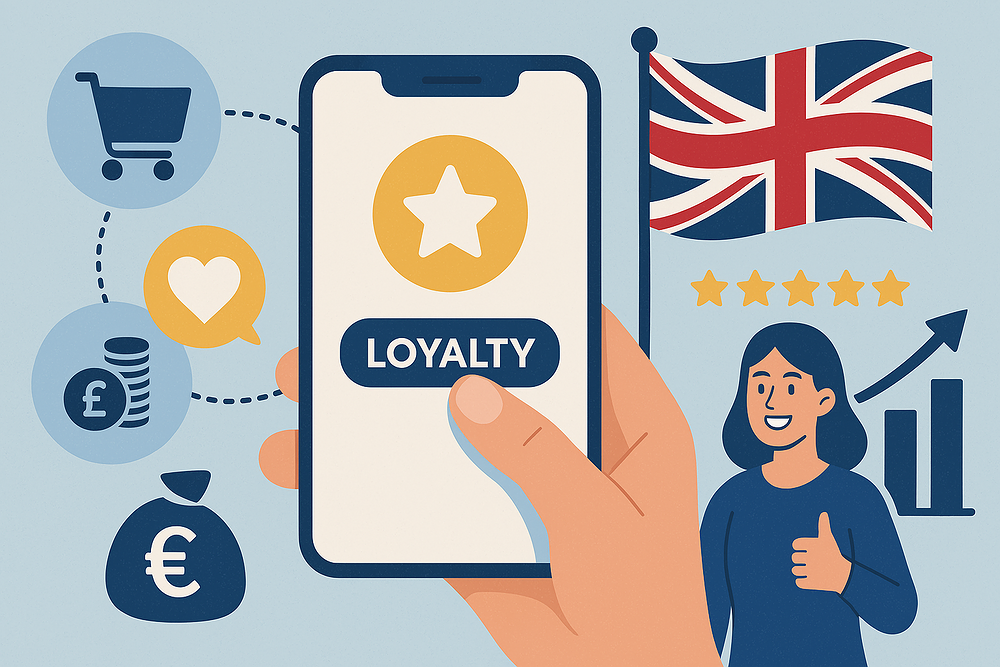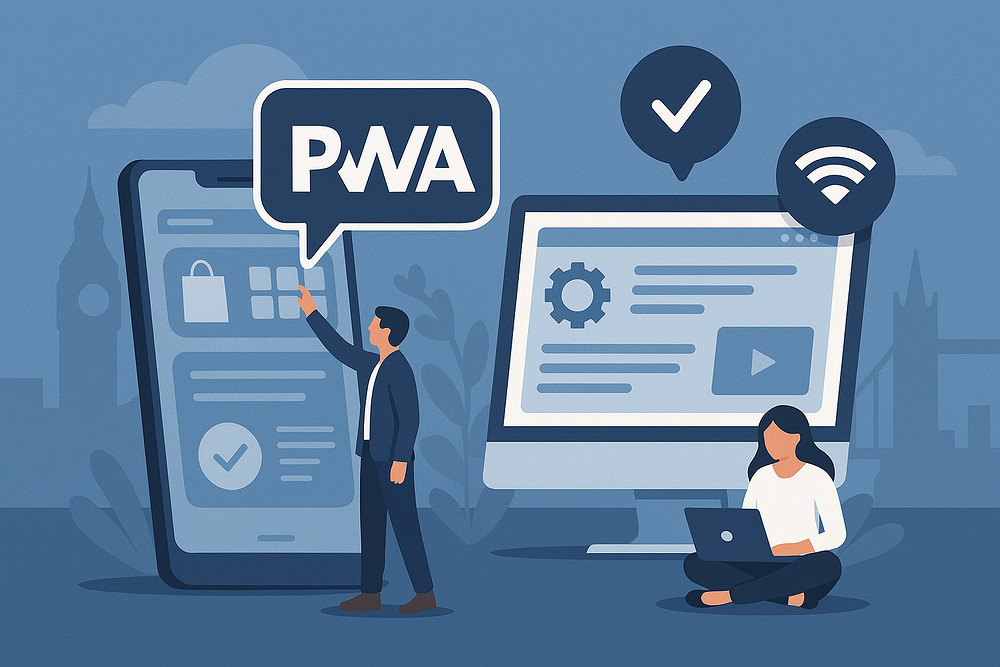Boost Customer Loyalty: How Mobile Apps Can Grow Your UK Business

Boost Customer Loyalty: How Mobile Apps Can Grow Your UK Business
In today's hyper-connected world, businesses across the UK are constantly seeking innovative ways to stand out from the competition, enhance customer experiences, and foster long-term loyalty. Mobile applications have emerged as a powerful tool in this endeavour, offering unparalleled opportunities to engage with customers and drive business growth.
Why Mobile Apps Matter for UK Businesses
The statistics speak volumes: over 92% of UK adults own a smartphone, with the average person checking their device approximately 58 times per day. This digital dependency creates a golden opportunity for businesses to establish a permanent presence on the devices their customers use most frequently.
Unlike websites, which require active navigation, mobile apps reside on users' devices, offering immediate access with just a tap. This accessibility translates to increased engagement, with mobile apps boasting 3-4 times higher conversion rates compared to mobile websites.
Key Benefits of Mobile Apps for Your Business
1. Enhanced Customer Experience
A well-designed mobile app streamlines the customer journey, making interactions with your business effortless and enjoyable. From simplified purchasing processes to personalised recommendations, mobile apps can transform ordinary customer experiences into exceptional ones.
Consider a local café that implements a mobile ordering system. Customers can browse the menu, customise their orders, and pay—all before arriving at the establishment. This convenience not only enhances the customer experience but also improves operational efficiency by reducing queues and minimising order errors.
2. Powerful Customer Insights
Mobile apps provide a wealth of valuable data about your customers' behaviours, preferences, and engagement patterns. This information can help you refine your offerings, tailor your marketing strategies, and identify areas for improvement.
For instance, a boutique clothing retailer might analyse app usage data to determine which product categories receive the most attention, which features customers engage with most frequently, and at what points in the browsing process potential customers abandon their shopping carts. These insights enable data-driven decisions that can significantly impact business outcomes.
3. Direct Marketing Channel
Your mobile app serves as a direct communication line to your customers, bypassing email filters and social media algorithms. Push notifications boast open rates of up to 90%, making them significantly more effective than email marketing campaigns, which typically achieve open rates of 20-30%.
A garden centre, for example, might send personalised notifications about plant care tips, seasonal offers, or upcoming workshops based on customers' previous purchases and browsing history. This targeted approach ensures that communications remain relevant and valuable, strengthening the customer relationship rather than becoming an annoyance.
4. Building Brand Loyalty
Perhaps the most significant advantage of mobile apps is their ability to foster customer loyalty. Through personalised experiences, loyalty programmes, and exclusive offers, apps can transform occasional customers into brand advocates.
A loyalty programme integrated into your app can reward repeat purchases, incentivise referrals, and celebrate customer milestones—all while gathering valuable data about purchasing habits. These programmes don't need to be complex; even simple point-based systems can significantly increase customer retention and lifetime value.
Success Stories: UK Businesses Transformed by Mobile Apps
Local Retail Success: The Boutique Breakthrough
A mid-sized fashion boutique in Manchester implemented a mobile app featuring a virtual fitting room, personalised style recommendations, and a loyalty programme. Within six months, they reported a 32% increase in repeat customers and a 28% boost in average order value. The app's "notify me" feature for restocked items created anticipation and urgency, resulting in products selling out within hours of restock notifications.
Service Industry Innovation: The Salon Solution
A hair salon chain across the Midlands developed an app allowing customers to book appointments, browse stylist portfolios, and receive maintenance reminders for their specific hair treatments. The result? A 45% reduction in no-shows and a 25% increase in retail product sales through personalised product recommendations based on customers' hair types and treatments.
Hospitality Game-Changer: The Restaurant Revolution
A family-owned restaurant group in Edinburgh implemented an app featuring table reservations, pre-ordering capabilities, and a digital loyalty card. The app contributed to a 35% increase in repeat visits and a 20% rise in average spend per table. Additionally, the ability to collect customer feedback directly through the app led to meaningful service improvements and menu refinements.
Getting Started: Practical Steps for UK Businesses
1. Define Your Objectives
Before diving into development, clearly articulate what you hope to achieve with your mobile app. Are you primarily focused on improving customer service, streamlining operations, boosting sales, or enhancing brand loyalty? Your objectives will guide the app's features, design, and functionality.
2. Understand Your Audience
Research your target audience's preferences, behaviours, and pain points. What devices do they use? What features would they value most? What problems can your app solve for them? User research might reveal, for instance, that your customers prioritise speed and convenience over extensive feature sets.
3. Focus on User Experience
A beautiful but complicated app will quickly be deleted. Prioritise intuitive navigation, fast loading times, and straightforward processes. Remember, every additional click or tap in the user journey increases the likelihood of abandonment.
4. Start Simple, Then Expand
Rather than attempting to launch with every conceivable feature, begin with a streamlined version that addresses core needs. Gather user feedback and usage data, then iteratively improve and expand the app's capabilities. This approach reduces initial development costs and allows you to adapt based on real-world usage patterns.
5. Integrate with Existing Systems
Ensure your app integrates seamlessly with your current business systems, such as inventory management, customer relationship management, and payment processing platforms. This integration creates operational efficiencies and provides a consistent experience across all customer touchpoints.
6. Promote Your App
Even the most brilliantly designed app won't generate value if customers don't know about it. Develop a comprehensive launch strategy that might include in-store promotions, email marketing, social media campaigns, and perhaps exclusive launch offers accessible only through the app.
The Future of Mobile Apps for UK Businesses
As technology continues to evolve, mobile apps are becoming increasingly sophisticated. Augmented reality features can allow customers to visualise products in their homes before purchasing. Artificial intelligence can provide hyper-personalised recommendations and support. Location-based services can deliver contextually relevant offers when customers are near your establishment.
These innovations aren't just for large corporations with substantial IT budgets. Increasingly accessible development platforms and specialised agencies are making advanced mobile app features available to businesses of all sizes.
Conclusion: A Competitive Advantage Within Reach
In an era where consumer attention is fragmented across countless platforms and channels, a mobile app offers something invaluable: direct access to your customers and a permanent presence on their most personal devices.
For UK businesses willing to invest in thoughtful app development, the rewards can be substantial—stronger customer relationships, valuable business insights, increased revenue, and a meaningful competitive advantage in an increasingly digital marketplace.
The question is no longer whether your business can afford to invest in a mobile app, but whether it can afford not to as competitors embrace this powerful tool for growth and customer engagement.
Talk to us about your next project
Our team of experts is ready to help bring your ideas to life with solutions tailored to your business.
Get in Touch

